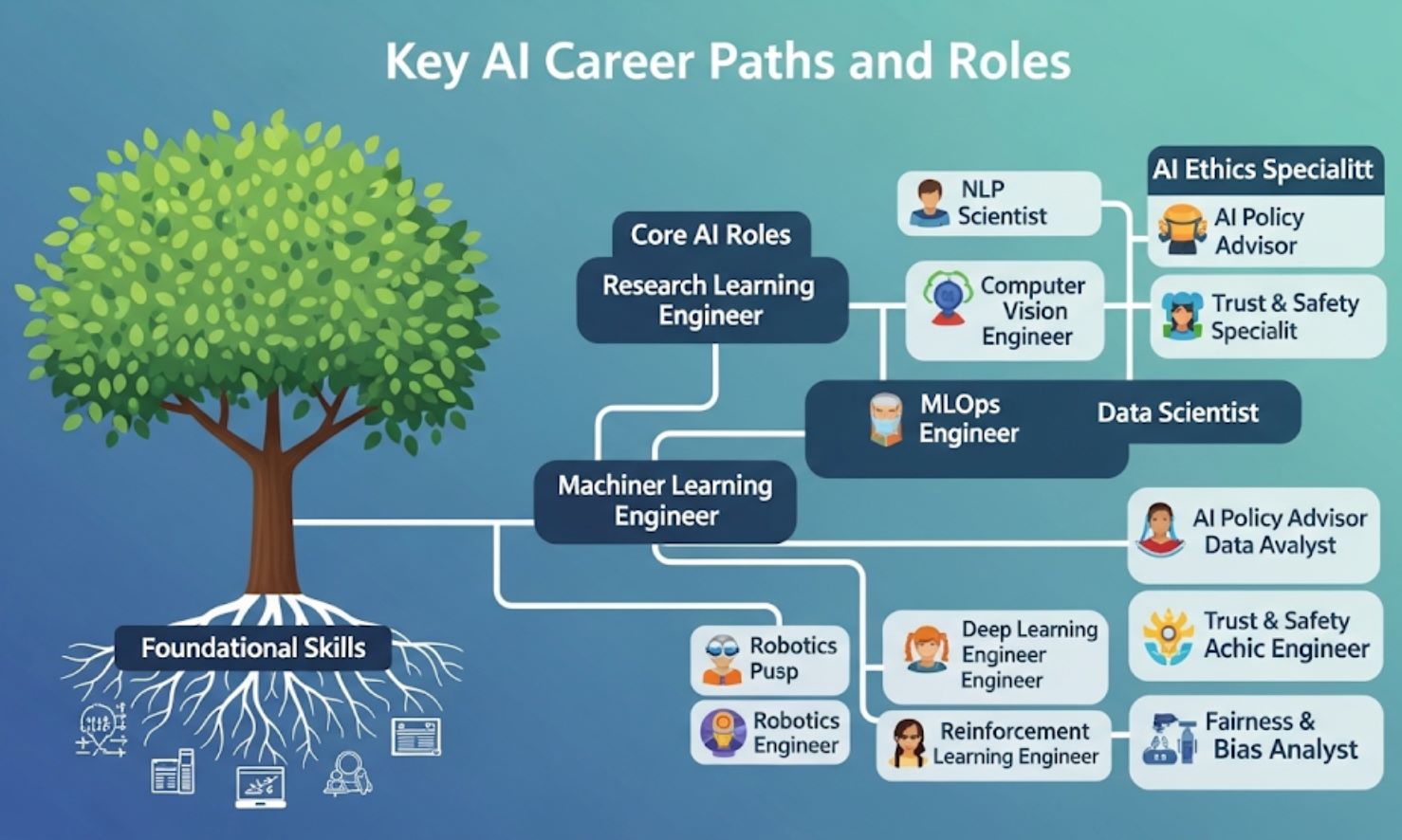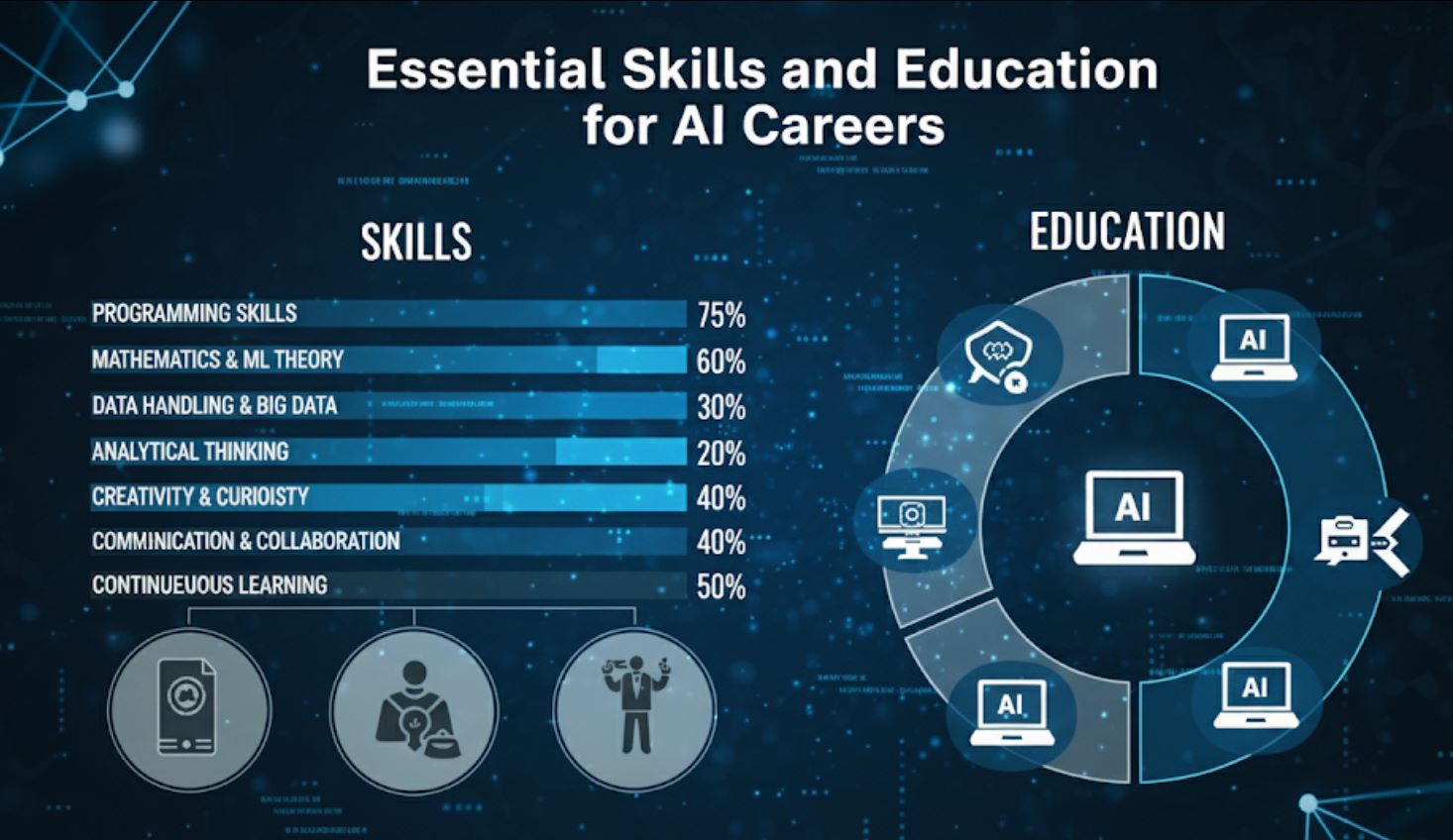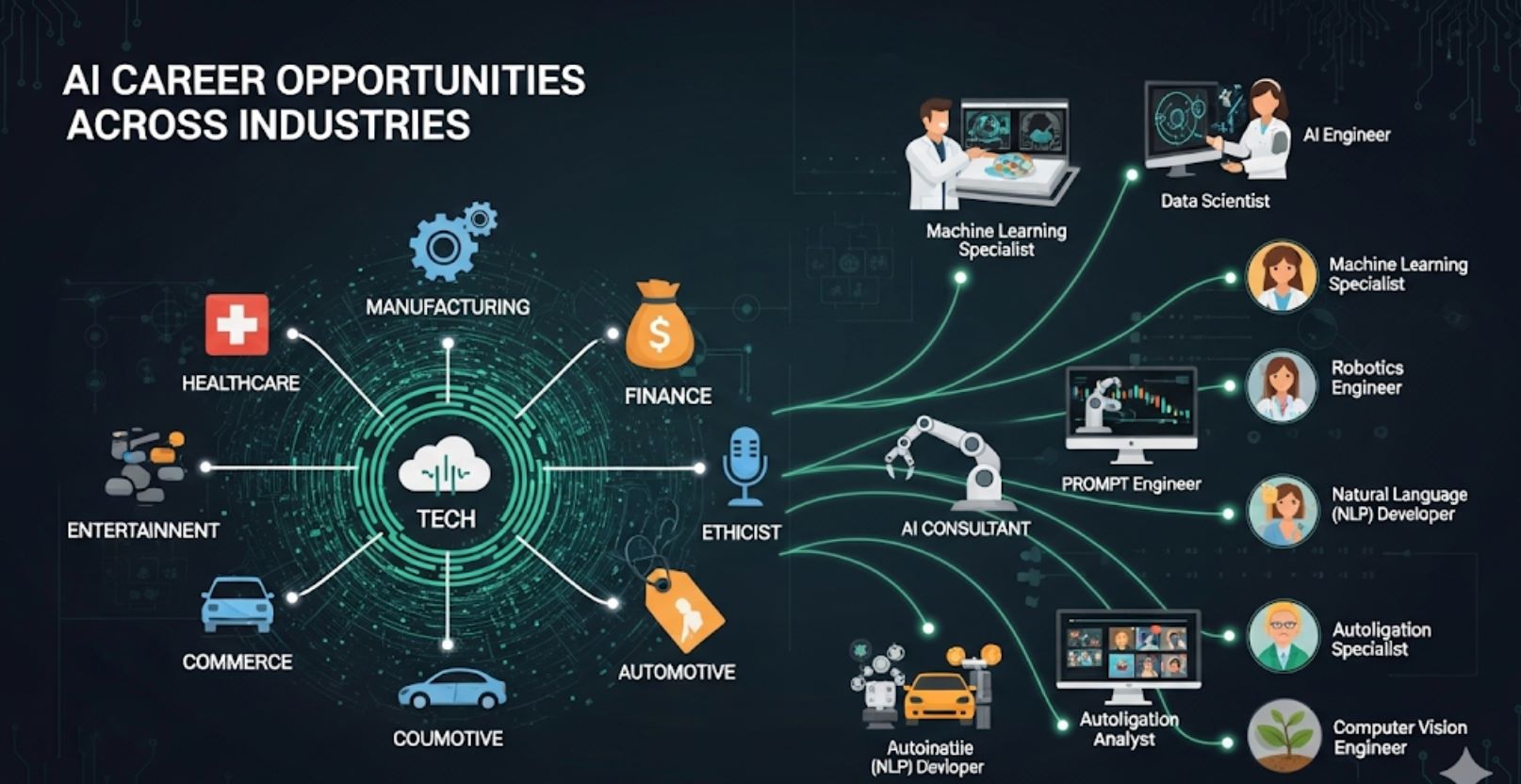Career opportunities in AI
The artificial intelligence (AI) industry is growing rapidly, opening up many attractive career opportunities for individuals and businesses. From data scientists, AI engineers, machine learning experts to data analysts, this field not only brings competitive income but also opportunities for sustainable development in the digital future.
Artificial Intelligence (AI) is transforming industries worldwide and creating an unprecedented demand for AI-skilled professionals. Organizations of all sizes are leveraging AI to improve efficiency, drive innovation, and gain a competitive edge.
As a result, new job roles that seemed futuristic just a few years ago are now critical across sectors, and even smaller companies are hiring AI talent to keep up. In this article, we'll explore the surging demand for AI professionals, the key career paths in AI, the skills you need, opportunities across industries, and how you can prepare for a thriving career in this exciting field.
The Growing Demand for AI Professionals
AI adoption has rapidly moved into the mainstream. Over 55% of companies are already using AI, and another 45% are currently exploring AI implementation – essentially nearly all businesses are on the path to AI integration.
Moreover, technological advancements in AI are expected to be transformational for businesses: 86% of employers surveyed globally predict that AI and information-processing technologies will change how they operate by 2030.
AI and Machine Learning Specialist roles are among the fastest-growing professions in the world.
— World Economic Forum
This widespread embrace of AI is fueling a hiring boom for people with AI expertise. In other words, demand for AI talent is skyrocketing as organizations seek to unlock AI's potential.
In practical terms, this means many AI jobs are going unfilled due to a lack of qualified candidates, making those with the right skills highly sought-after.
Premium Compensation
Companies are paying a premium for AI expertise.
- 56% higher wages for AI-skilled workers
- Exceptional career opportunities
- High demand across industries
Career Advantage
AI skills open doors to abundant opportunities.
- High job security
- Competitive benefits
- Innovation-focused roles
The takeaway is clear – mastering AI skills opens doors to abundant, well-compensated career paths in today's job market.

Key AI Career Paths and Roles
A wide range of career paths has emerged for professionals interested in AI. Not all AI jobs are the same – there are technical development roles, analytical roles, as well as strategic and ethical oversight positions.
Below are some of the in-demand AI-related job roles and what they entail:
Machine Learning Engineer
Data Scientist
AI Research Scientist
Data Engineer
Robotics Engineer
AI Product Manager
AI Ethics Specialist

Essential Skills and Education for AI Careers
Succeeding in an AI career requires a blend of strong technical skills and well-rounded soft skills. In fact, "AI and big data" proficiency now tops the list of fastest-growing skills that employers need.
Here are some of the essential competencies and qualifications aspiring AI professionals should develop:
Core Technical Competencies
- Programming Skills – Solid software development abilities are fundamental. Proficiency in languages commonly used in AI (such as Python, R, or Java) and experience with AI/ML frameworks (like TensorFlow, PyTorch, or scikit-learn) is crucial for building and deploying models.
- Mathematics and ML Theory – A strong foundation in math (linear algebra, calculus, probability, statistics) underpins most AI algorithms. Understanding machine learning theory and models (from basic regression and classification to advanced deep learning architectures) allows you to design and tweak AI systems effectively.
- Data Handling and Big Data – Real-world AI runs on data, so skills in collecting, managing, and processing large datasets are highly valued. Knowledge of databases, data engineering, SQL, and big data tools (Hadoop, Spark) helps ensure you can prepare the data that AI algorithms require.
Critical Soft Skills
- Analytical Thinking and Problem-Solving – The ability to think critically and solve complex problems is perhaps the most important soft skill in AI roles. AI work often involves formulating hypotheses, interpreting model results, and troubleshooting issues – all of which demand sharp analytical and logical reasoning.
- Creativity and Curiosity – Successful AI practitioners are often creative thinkers who can innovate and find new approaches. As routine tasks become automated, human creativity grows in importance – indeed, creative thinking and curiosity for lifelong learning are among the fastest-rising skills in demand. Designing novel AI solutions or features requires imagination and the willingness to experiment.
- Communication and Collaboration – AI projects are typically team efforts, bringing together engineers, data scientists, domain experts, and business leaders. Being able to communicate technical concepts clearly to non-experts, work in interdisciplinary teams, and translate data insights into business strategy is key. Strong written and verbal communication and teamwork skills will amplify your effectiveness as an AI professional.
- Continuous Learning and Adaptability – Perhaps most importantly, one must be eager to keep learning. The AI field evolves at a breakneck pace; tools and techniques that are cutting-edge today may become outdated within a few years.
Educational Pathways
Educationally, many AI professionals hold degrees in computer science, data science, engineering, or related fields. An advanced degree (Master's or Ph.D.) can be advantageous for research-oriented or specialized roles, though it's not always required.
Formal Education
Traditional degree programs
- Bachelor's in Computer Science
- Data Science degrees
- Engineering programs
- Advanced degrees (Master's/Ph.D.)
Alternative Learning
Flexible skill-building options
- Online courses and MOOCs
- Professional certifications
- AI/ML bootcamps
- Self-directed projects
Success Formula: The combination of formal education, practical projects, and a self-driven learning mindset will set you up for success in the AI job market.

AI Career Opportunities Across Industries
One of the exciting aspects of AI careers is that they are not limited to the tech industry. AI professionals are needed in virtually every sector of the economy.
In other words, no matter your industry of interest, there's likely a demand for AI skills. Here are a few major sectors where AI-driven roles are booming:
Technology Sector (Software & IT Services)
Unsurprisingly, tech companies are at the forefront of AI development. Major software firms, cloud computing providers, and AI startups are hiring thousands of AI engineers and data scientists to build AI products and platforms (such as search engines, voice assistants, and enterprise AI services).
- Developing cutting-edge AI applications
- Researching new AI techniques
- Building AI platforms and services
- Core employer of AI talent
Healthcare and Biomedicine
AI is revolutionizing health care, creating roles for AI specialists in hospitals, pharmaceuticals, and medical technology companies.
Medical Imaging
AI systems that help radiologists detect diseases from X-rays and MRIs
Drug Discovery
Using AI to accelerate pharmaceutical research and development
Predictive Analytics
Forecasting patient outcomes and treatment effectiveness
Personalized Medicine
Algorithms for tailored treatment plans
Finance and Banking
The finance industry was an early adopter of AI and continues to offer rich career opportunities. Banks, fintech startups, insurance companies, and investment firms employ AI and ML experts to work on various applications.
- Fraud detection systems
- Algorithmic trading programs
- Credit risk modeling
- Customer service chatbots
- Investment portfolio optimization
AI roles in finance often involve working with big financial datasets to find patterns and detect anomalous transactions.
Manufacturing and Automotive
Factories and engineering companies are implementing AI to optimize production and create smarter products, driving demand for AI-skilled workers in these fields.
Smart Factory Solutions
- Automated quality inspection systems
- Predictive maintenance algorithms
- Adaptive industrial robots
Autonomous Systems
- Autonomous vehicles
- Advanced driver-assistance systems
- Supply chain optimization
Retail and Marketing
Retailers and consumer brands are leveraging AI to better understand and serve their customers, creating roles for AI professionals in commerce and marketing.
- Recommendation engines ("Customers who bought X also like Y")
- Demand forecasting models for inventory management
- Personalized advertising campaigns
- Consumer segmentation analytics
- AI-generated marketing content
Key Insight: Whether your passion is in health, finance, engineering, or beyond, AI skills can be your ticket into that industry. While tech companies led the AI wave, today every industry is integrating AI projects – and they need knowledgeable people to lead those initiatives. This makes AI careers truly global and cross-disciplinary in nature.

How to Launch a Career in AI
If you're excited about the possibilities in AI, you might be wondering how to get started or advance in this field.
Here are some steps to help you launch a successful AI career:
Invest in Education and Skill-Building
Begin with a strong educational foundation in relevant fields. Pursue a bachelor's degree in computer science, data science, engineering, or related disciplines that cover programming, algorithms, and statistics.
Building a solid base of knowledge will prepare you for the technical challenges of AI roles.
Gain Practical Experience
Hands-on experience is crucial. Apply your skills in real projects – for example, work on AI or data science projects during school, contribute to open-source AI libraries, or build your own machine learning models as practice.
- Participate in hackathons or coding competitions
- Seek internships or entry-level jobs involving AI or data analysis
- Build a portfolio of AI projects
- Create a GitHub repository showcasing your code
Practical experience not only reinforces your learning but also creates work examples you can show to potential employers.
Continuously Upskill and Stay Current
Because AI technology evolves so rapidly, commitment to lifelong learning will set you apart. Keep up with the latest AI research and industry trends – for instance, new developments in generative AI or novel neural network techniques.
Amazon launched an initiative to train 2 million of its employees in AI skills by 2025 to ensure its workforce stays ahead.
— Amazon Corporate Initiative
Whether it's learning a new programming library or understanding an AI ethics framework, always be ready to update your skill set. This adaptability will help future-proof your career in the dynamic AI field.
Network and Engage with the AI Community
Networking can open doors in any career, and AI is no exception. Join AI-related communities, professional associations, or online forums where you can learn from others and find mentorship.
Events & Conferences
Connect with professionals and recruiters
- Industry conferences
- Workshops and seminars
- Local meetups
Thought Leadership
Build your professional reputation
- Contribute to research papers
- Blog about AI projects
- Share insights online
The more you connect with the AI ecosystem, the more visible and integrated you become, which can lead directly to career opportunities.
Success Formula: Employers in AI look for proof that you can solve real problems with your skills. By educating yourself, practicing on projects, staying current, and networking, you'll put yourself in an excellent position to land a rewarding role in AI.

Future Outlook: A Dynamic and Rewarding Field
The career outlook in AI is exceptionally bright and continually evolving. AI isn't a static field – new breakthroughs lead to new job opportunities.
For example, the recent surge in generative AI (AI systems that create text, images, etc.) has already spawned entirely new roles and specializations.
AI-Driven Cybersecurity
Emerging roles in AI-powered security solutions
Autonomous Systems
Specialists in self-operating AI systems
AI Ethics and Policy
Governance and responsible AI implementation
As AI technology matures, we can expect similar waves of innovation that create demand for expertise in these emerging areas.
Current Reality
- AI automating routine tasks
- Some roles becoming obsolete
- Need for reskilling
Net Job Growth
- Tens of millions of new roles by 2030
- AI competencies in existing jobs
- Careers we're only beginning to imagine
It's also important to note that AI will not only create new jobs but also transform existing ones. Many roles will evolve to incorporate AI competencies – much like how proficiency with computers became a basic requirement for most jobs.
By one estimate, the ongoing AI and automation trends will result in a net increase of jobs globally by 2030 as new occupations emerge to augment those that are made redundant.
In the coming years, businesses and society will continue to navigate how to best use AI responsibly. This means professionals who understand both the technical and human dimensions of AI will be highly valued.
If you choose to build a career in AI, you'll be at the cutting edge of innovation, solving meaningful problems – from curing diseases to combating climate change to building smarter cities – using one of the most powerful toolsets of our time.
It's a field that rewards curiosity, creativity, and continuous growth.

Conclusion: Your AI Career Awaits
In conclusion, AI offers a world of opportunity for those ready to embrace it. Whether you're a software engineer, an analyst, or a visionary entrepreneur, there's a place for you in the AI revolution.
High Demand
Unprecedented need for AI professionals across all industries
Competitive Salaries
56% higher wages for AI-skilled professionals
Transformative Projects
Work on solutions that shape the future
The combination of high demand, competitive salaries, and the chance to work on transformative projects makes AI one of the most exciting career paths in the modern economy.
By developing the right skills and staying adaptable, you can ride the wave of AI's growth and build a fulfilling, future-proof career in this dynamic field.







No comments yet. Be the first to comment!